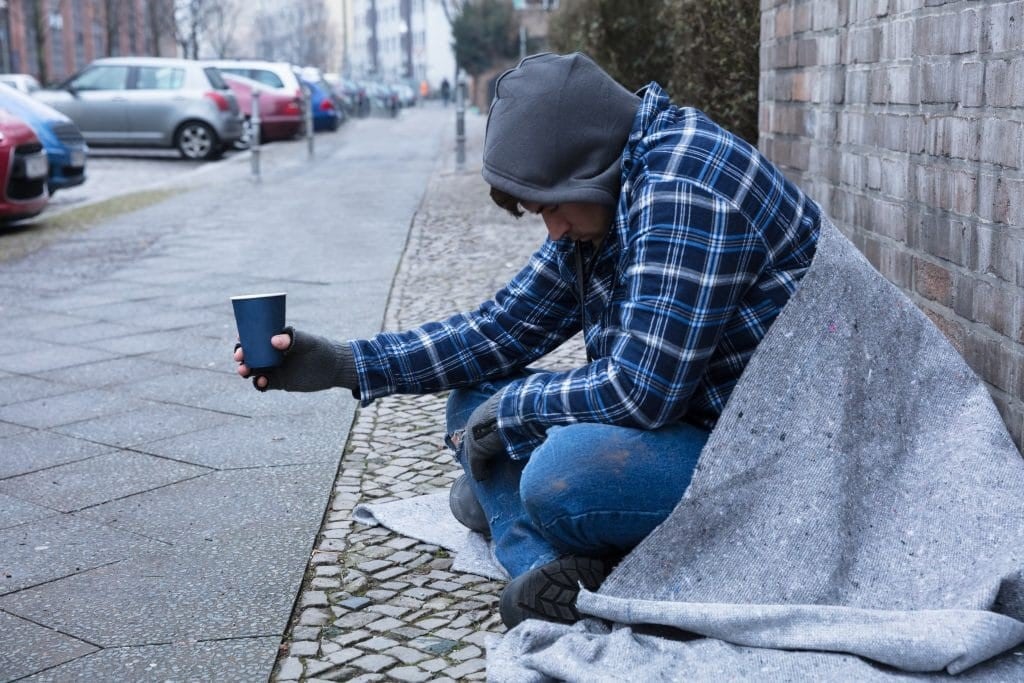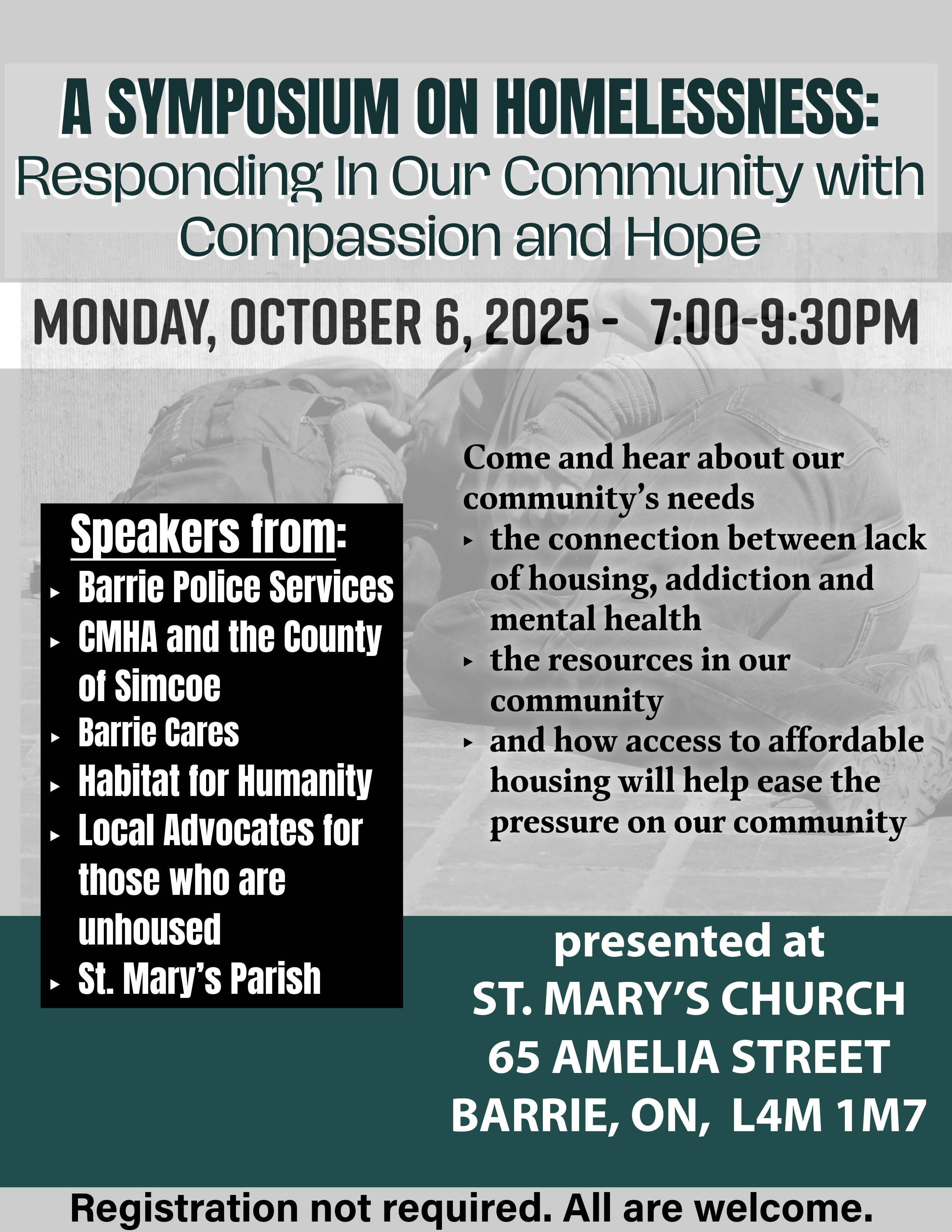
Symposium on Barrie's Unhoused - October 6, 2025


 |
A Symposium to Educate our Community on Homelessness in Barrie
On the evening of September 23rd 2024 at St. Marys’ Church, Fr. Larry hosted the parish’s first symposium on homelessness. To say it was an overwhelming success would be understatement. Discussions on homelessness and affordable housing were presented by various agencies in Barrie & Simcoe County to more than 400 citizens of Barrie who were eager to hear the talks and consider ways we could move forward from this auspicious event.
Our host and moderator, Fr. Larry introduced the topic of the evening and explained the 2 sides—or ‘2 Feet of Love in Action’ to this issue: We consider the Charitable Works—the ‘right foot’ such as the outreach, meal programs etc. which tend to focus on the immediate and basic needs of individuals and the Social Justice—the ‘left foot’ that deals in ways to improve the conditions by determining and eliminating the root causes. After highlighting that focus of the evening is designed to look at the ‘Left Foot’, Fr Larry asked the audience: “What are your concerns about the lack of adequate affordable housing in Barrie?” The answers were numerous. Here’s a sampling, in no particular order:
- Children suffering from unaffordability
- The inalienable right to adequate housing for ALL
- Health-both physical and mental-and safety concerns especially in encampments
- Government inaction—especially at the federal and provincial levels
- Too many band aid solutions
- Transitional housing needs
- Housing as the foundation to dignity and identity
With these issues moved to the ‘parking lot’ for future reference, the panel was given its time.
First up were representatives from the Simcoe County Housing Corporation (SCHC) with Bradley Spiewak, the Director of Social Housing and Laura McCallum, the Manager, Housing Programs.
https://www.simcoe.ca/homelessnesssystem
https://simcoe.ca/residents/housing/affordable-housing-programs
https://simcoe.ca/residents/housing/
Affordable housing in Barrie falls under the jurisdiction of the County of Simcoe which is the designated Housing Service Manager under the Housing Services Act, 2011 & Regulations and is responsible for planning, funding and managing social housing programs and homelessness services throughout Simcoe County including all urban centres.
But we are reminded that there are multiple pieces of legislation as well as policies & procedures from all levels of government and these may be altered as governments change.
With respect to affordable housing, the SCHC considers:
- Social housing: Rent-Geared to income housing (RGI) and Low End Affordability
- Community housing
- Supportive & Transitional Housing
Along with these are rent supplement & low end mortgage/down payment assistance, rent supplements, secondary & garden suite grants, urgent repair and accessibility needs assistance and housing retention initiatives. All affordable housing has wrap-around services available on site. However, it must be noted that affordable housing considers those with regular incomes
The County of Simcoe is redeveloping and updating its 10-Year Affordable Housing and Homelessness Prevention Strategy for 2025.
Next up was Sara Peddle, Executive Director of the David Busby Centre in Barrie. https://www.busbycentre.ca/
She first pointed out that Shelters are temporary housing and not permanent residences.
Along with the Busby Centre, other shelters in Barrie include:
- Elizabeth Fry Society, serving women and gender diverse
- Salvation Army Bayside Mission, serving men
- Youth Haven, serving youth ages 16 to 24 years old
- Women and Children’s Shelter
Most beds provided by Busby are government funded, but some are not. There are also ‘respite’ beds for those who request and are granted them. Busby has to comply with strict county standards for its operation. It must assess and triage those wishing to make use of the facilities. There are currently 16 homeless encampments within Barrie. Busby will conduct a census of the homeless on Oct 6-8.
Ms Peddle’s biggest heartache is to have to turn people away, since there are not enough beds to go around. There is a process in place to have those within the shelter system apply for permanent housing should they desire, however the bureaucracy is quite extensive.
She also noted that, in her experience, no one wishes to not be housed. Those who choose not to accept shelter space may feel that it is not acceptable or conducive to their needs and wants; so they choose to stay outside, perhaps in encampments or on the streets.
After a short break, where there was much discussion and interaction amongst the attendees and members of the panel, the evening continued with Rev. Dr. Susan Eagle who is affiliated with Barrie Homelessness & Housing Justice Network (BHHJN)—a multidisciplinary network of homelessness and housing advocates who have come together to promote the right to housing and the elimination of chronic homelessness in Barrie. The group meets for a monthly dinner with ALL parties including the homeless to discuss issues and plans. https://www.bhhjn.ca/
According to statistics which are generally quite under estimated, there are 234,000 unhoused people in Ontario. NOT ALL ARE UNEMPLOYED
A protest sign at a recent clearing out of a homeless encampment sums up her feelings for the topic in Barrie:
“I CAN’T BELIEVE I HAVE TO PROTEST THIS”
The United Nations UNIVERSAL DECLARATION OF HUMAN RIGHTS (1948) affirms that:
Article 17
- Everyone has the right to own property alone as well as in association with others.
- No one shall be arbitrarily deprived of his property.
Article 25
- Everyone has the right to a standard of living adequate for the health and well-being of himself and of his family, including food, clothing, housing and medical care and necessary social services, and the right to security in the event of unemployment, sickness, disability, widowhood, old age or other lack of livelihood in circumstances beyond his control
The National Housing Strategy Act 2019.
4 It is declared to be the housing policy of the Government of Canada to
- (a)recognize that the right to adequate housing is a fundamental human right affirmed in international law;
- (b)recognize that housing is essential to the inherent dignity and well-being of the person and to building sustainable and inclusive communities;
- (c)support improved housing outcomes for the people of Canada; and
- (d)further the progressive realization of the right to adequate housing as recognized in the International Covenant on Economic, Social and Cultural Rights.
The City of Barrie, through Bills 067 & 068, which overturns sections of Bylaws 2019-059 & 2004-142 by disallowing the interaction of its citizens with those housing challenged and taking strong action against those living in temporary, unregulated accommodations on public land, is in direct contravention of the above stated rights to housing for everyone.
The BHHJN looks at housing needs through 3 dimensions:
- Creating new spaces
- Converting existing spaces
- Maintaining existing spaces
It is good to create new housing, however, there is plenty of existing spaces that may be renovated to meet current codes with minimal cost and it is not necessary to destroy spaces just because they are vacant.
Lastly, we heard from Ms Mel Hinch of the Society of St Vincent de Paul who explained their food card system for the poor and just how much many people in Barrie rely on the $25 cards in a program with Giant Tiger stores in Barrie. Funding for these cards comes completely from donations of church members.
In some cases, the recipients are a short step away from homelessness. Many rely on the Barrie Food Bank for assistance, but in some cases the Food Bank does not go far enough and they will call upon the SSVP to fill the gap. Some recipients have jobs, others rely on government assistance.
To summarize, the evening went well beyond expectations. All those present were able to engage on different levels. Challenging questions were posed and answers, although not totally forthcoming, got participants thinking in the right direction. With the momentum generated by the evening, it is apparent that the time is right take more direct action on the challenges for those experiencing homelessness. But it is the ancillary concerns as well: employment, affordability, mental & physical health, drug & alcohol abuse that bare equal consideration. Oftentimes they are directly linked with the need for adequate housing.
All these issues and concerns go well beyond what was achieved at the symposium. Advocacy includes an action sequence involving governments at all levels as well as communities and individuals who not only see the need but are willing to act.
Root cause theory states that if some money & resources are spent now to investigate and eliminate the situation, much more money will be saved in the future and the resources will be in place to maintain the desired conditions. Band aids do not work. Collectively, we have the desire and ability to make this happen.
“FROM SHELTER TO HOUSING”.
